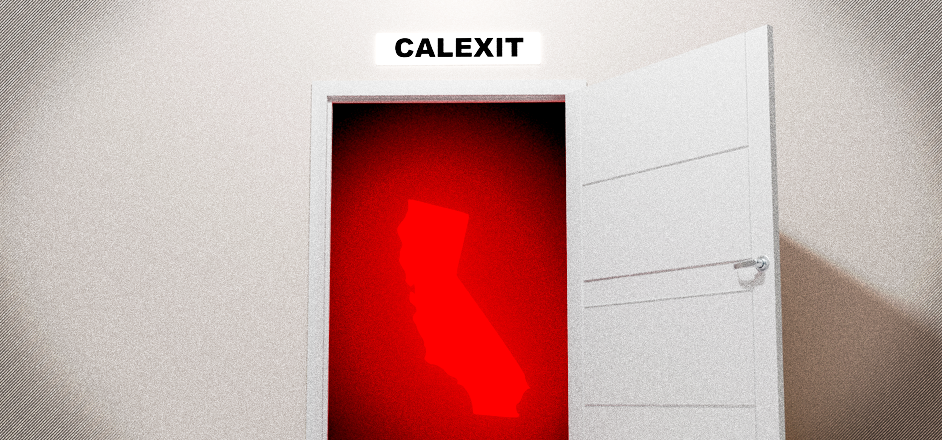By now, you might have heard of Calexit, the petition for the state of California to succeed from the United States of America in 2019.
It’s a pretty entertaining idea, one that one in three Californians currently support. But, is it actually possible?
Technically, yes. California is independent as shit. It produces the most food of any state — half of all domestically grown fruits, nuts and vegetables, as well as a whopping share of the livestock and dairy. It’s full of natural resources like coal, gas and oil, yet is on the road to creating half of its energy from renewable sources like solar and wind by 2030. It has the entertainment industry and Silicon Valley, two industries which drive culture as much as they do economic growth. Los Angeles is home to the two largest seaports in the Western Hemisphere. In fact, California has the sixth largest economy in the world, surpassing France. The only thing it doesn’t have is water, but hey — who needs that when you have Gatorade?
Those factors alone almost guarantee California’s self sufficiency as a country, something that Yes California, the organization responsible for organizing the Calexit petition, use to argue in favor of breaking away from the United States.
They make a few good points on their website for Californian independence, and are currently petitioning Californians to pass a citizens’ initiative on the 2018 ballot, so that a special election for succession can be held in 2019.
But here’s the thing: when it comes to Calexit, what’s plausible is laughably insignificant when it’s met with what’s possible.
Even if Californians were to vote to secede, it wouldn’t matter. There’s no way the United States government would let it go, for all the very same reasons that make California potentially self-sufficient. The fact that California pays the most in federal income taxes and contributes the most to the the country’s GDP make it far too valuable a resource to let go of without a fight.
And then, California’s only remaining option would be armed conflict.
Jim Newton is a lecturer on public policy at UCLA, a veteran journalist of 25 years at the Los Angeles Times, as well as an author of three best-selling books and the only guy any of my sources said they knew of who could speak intelligently on this issue — especially since Yes California's organizer and "President" ducked our interview requests at every turn, except for the one time he told us to call him in Russia.
Our first question for him was simply, “Could this happen?” Could California actually leave the United States if it wanted to?
“Technically, yes,” he told us. “But with the big fat caveat that it’s extremely unlikely.”
Jim went on to point out that the last major secession from the union didn’t exactly go well (see: The Civil War) and that there isn’t actually a constitutional method by which a state can secede without amending the Constitution, a pipe dream considering it’s only happened 17 times in the past 227 years. Even if there were an existing amendment to grant succession, three-fourths of the other 49 states would have to vote for it. And you know no vindictive New Yorker who’s butt-hurt about having to endure weeks of freezing sleet and rat-infested mini-apartment is going to let sunny California go off and be its free self.
However, there was one sort-of precedent for Calexit that gives a hint of how a secession might be achieved were the necessary Constitutional amendments in place. Jim cited the attempted secession of San Fernando Valley from Los Angeles in 2002 as a possible example. Back then, the logic was if you could get enough people both in the valley and in the city who wanted the split to occur, and the whole affair could be revenue neutral, then c'est la vie.
“Short of armed conflict, it would have to resemble that,” said Jim. “A vote of the states, and a vote of the people.”
Jim is realistic, though. He’s pretty confident that Californian independence has a snowball’s chance in hell of ever happening — also because there’s isn’t a single wedge issue that hugely divides California from the rest of the country.
“There isn’t a ‘I’ll fight my brother to the death’ mentality about it,” he tells us. “There is no institution, like slavery, that divides United States and California in such a unique way.
California is an outlier state, but it very much exists within the United States. It’s a big place, it’s a liberal place. But that’s not the rationale for a civil war.”
However, Jim does acknowledge that it’s important to “Protect sanctuary cities, stop deportation agents from entering universities campuses or elementary schools” as well as explore what the limits of the federal authority are, and seek areas where California can act independently from federal law when it’s in the state’s moral interest.
But those issues aside, California also benefits hugely from being part the United States — receiving about $370 billion a year from the federal government. So it’s not a completely one-sided relationship for California either.
“The economies and the people of the Unites States are so intertwined,” said Jim. It’s baffling to me why California would want to go just because we don’t like the president. And it’s baffling to me why the United States would want California to go just because it’s liberal.”
So while it might seem fun and even therapeutic to take “the resistance” to the next level and sign up for Yes California’s mailing list, it is at best a futile effort, and at worst, a potential call for armed conflict.
Also, if you do subscribe, you’ll get an annoying email once a week suggesting that you send Yes California $250 so they can buy radio and TV ads.



Leave a Reply